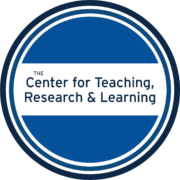2019-2020 CTRL Faculty Learning Communities
Three FLCs were facilitated during the Spring 2020 semester. Each FLC includes the description, facilitator, and final products if applicable.
Antiracist Pedagogy
Program Overview
Antiracist pedagogy is a classroom instructional practice that centers on the disruption of racism. As a pedagogy, it promotes the development of critical consciousness through multiple experiences of reflecting upon oppressive power relationships in one’s daily life. Anti-racist pedagogy is not simply incorporating racial content into courses. Rather, it is also about how one teaches, even in courses where race is not the subject matter. If we are truly seeking to embody inclusion in our classrooms, then that effort must be coupled with the eradication of racism, the core social operation that maintains inequities in our classroom spaces. This multidisciplinary FLC is designed for faculty committed to incorporating antiracist pedagogy into their Spring 2020 courses. Dr. Ibram Kendi’s (School of International Service/Antiracist Policy Center) book, How to be an Antiracist will be used as a guide to stimulate conversations. The goal is to co-construct a collaborative community that will develop skills for antiracist methodologies in the classroom.
This FLC was facilitated by Dr. Amaarah DeCuir, a CTRL Inclusive Pedagogy Fellow and professorial lecturer in the School of Education.
Rethinking Student Peer Review
Program Overview
In many disciplines, including academia, peer review is an essential part of our lives. From the informal, quick reviews of our colleagues’ work to more formalized double-blind peer reviews for journals, we are required to provide constructive feedback to each other in many settings. Learning how to do this can be challenging, and teaching students to peer review is especially difficult. Often, we turn our students loose on their peer’s drafts with little to no direction and the process can be both frustrating for the reviewer and provide feedback that is of little value to the reviewee. This faculty learning community will act as a working group to research, implement, and share strategies for facilitating peer review in our classes. We will meet monthly with the goal to disseminate materials and findings to the AU community.
This FLC was facilitated by Dr. Erin Horan, a CTRL Instructional Designer focused on research on the Scholarship of Teaching and Learning and an adjunct professorial lecturer in the Psychology Department.
Final Products
- Facilitator Reflection, Erin Horan
- Paper: Critical Reflection of Peer Review, Jason Rancatore
- Workshop: Blackboard Groups and Peer Review, Amy Trietiak and Erin Horan
Transitioning Your Scholarship to R
Program Overview
This FLC is designed for faculty who are interested in transitioning their analytic, empirical work to the open-source statistical software R. There is often a learning curve with a new piece of software that a single introductory workshop or weekend boot camp cannot overcome. To build meaningful proficiency learners must have sustained interaction with the platform and get their hands dirty by applying it to data and analytic approaches relevant to their own scholarly work. This FLC presents faculty with a semester-long framework to do just that. In addition to sessions on foundational concepts like data analysis, transformation, and visualization, much of the FLC’s content will be driven by the interests and needs of the participants. The FLC is also designed to include dedicated coding time which will function as both a writing-group-like environment of accountability partners as well as a place to collaboratively troubleshoot errors encountered along the way. Ideally, participants will come to this FLC with a research project in mind and commit to carrying out the analysis using R/R Studio. Faculty who have previously worked in another statistical platform (ex. SPSS, Stata, SAS, etc.) are encouraged to bring their prior scripts and analytic approaches as a starting point.
This FLC was facilitated by Dr. Eric Schuler and Dr. Bill Harder, CTRL Research Methodologists, who both use R extensively in their scholarship and teaching.

